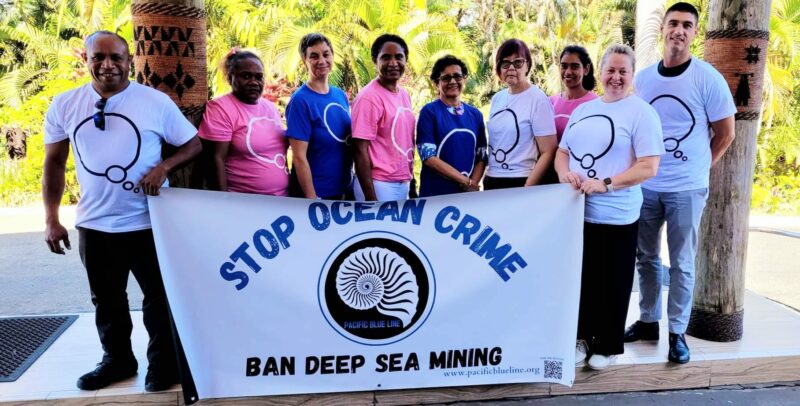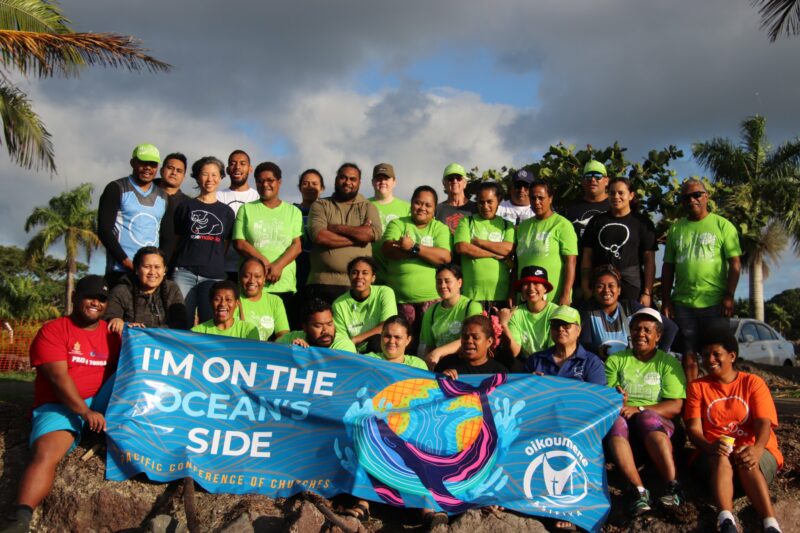Ocean protectors urged ‘Stop Ocean Crime, Ban Deep Sea Mining’
Originally published on Global Voices

‘Ban Deep Sea Mining”. Photo from the Facebook page of Oxfam in the Pacific. Used with permission.
Various Pacific groups celebrated Ocean Week and Ocean Day on June 8 by calling on officials to reject deep-sea mining (DSM) in the region.
Deep-sea mining is the practice of extracting minerals from the ocean floor, which threatens marine life and ecosystems. Because of its potentially massive impact, the International Seabed Authority of the United Nations is drafting regulations against deep-sea mining that could take effect in July 2023. So far, the island nations of Nauru and Tonga have expressed interest in pursuing measures to ban or limit DSM.
The regional network Pacific Blue Line is actively opposing DSM and warns how this extractive practice would exacerbate the harsh impact of climate change that is already ravaging island communities in the Oceania region.
Pacific governments keen to pursue DSM have to ask themselves, to what extent are they willing to destroy the ocean’s life support system during a time of climate, and planetary emergency and in what is commonly known as the age of extinction. Our governments must ask themselves who stands to gain the most from the destruction of our ocean.
It would be beyond ironic if leaders of Pacific Island countries, which are already at the forefront of the impacts of climate change and facing existential threats to territorial integrity, allow themselves to be persuaded to mine the ocean floor, thereby pushing the world into the doomsday scenario.
A petition was launched to mobilize public opposition against DSM. This initiative is supported by the Pacific Parliamentarians’ Alliance on Deep Sea Mining which released a statement highlighting the destructive colonial legacy in the Pacific and how DSM would exacerbate the exploitation of the region under the guise of pursuing development.
Recent Pacific history is replete with experiences of exploitation under the guise of social and economic development pathways that, in reality, involved frontier industries that were inherently experimental. Decades of atmospheric and underground or submarine nuclear testing, terrestrial mining and other land-based extractive industries are pertinent examples. Such historical exploitation holds much responsibility for the realities of many Pacific Islands societies today; realities that serve to shrink our options and entice our countries to repeat unsustainable patterns of economic development.
During the Ocean Week in early June, Pacific Blue organized lectures and webinars to explain how DSM would destroy not just the environment but also the way of life in island communities.
Awesome #ocean warriors sharing their perspectives on state of the Oceans and why is important to revitalise & defend it through collective action, in the face of growing ocean degradation by the collective @pacblueline#bantoprotect #deepseaminders #worldoceansday2022 pic.twitter.com/Tdr3otosUt
— PIANGO Pacific 2030 (@Pacific_2030) June 6, 2022
Instead of DSM, Pacific groups have unveiled an alternative agenda promoting a “blue economy” that focuses on ocean protection and grassroots development.
Kick-starting a week of celebrating our ocean. #PRNGO+, @UtoNiYaloTrust, @lotupasifika, @Pacific_2030 & partners today hosted a prayer vigil to launch the collective's report on #BlueEconomy. This report presents the concerns of #Pacific CSOs on the issue of Blue Economy. pic.twitter.com/yabZAXM0cY
— PANG (@pangmedia) June 5, 2022
In celebration of Ocean Day, grassroots organizations around the pacific organized protests and events to reflect the growing opposition to DSM. In West Papua, Indonesia, young volunteers organized a coastal clean-up while promoting a petition against DSM.

Young Papuans taking a pledge against deep sea mining. Photo from the Facebook page of Youngsolwara
In Fiji, the Pacific Conference of Churches gathered several individuals and groups together as part of the campaign against DSM:

A group activity celebrating Ocean Week. Photo from the Facebook page of the Pacific Conference of Churches.

“Stop Ocean Crime”. Photo from the Facebook page of the Pacific Conference of Churches.

Coastal clean up near the University of South Pacific. Photo from the Facebook page of the Pacific Conference of Churches
Post a Comment